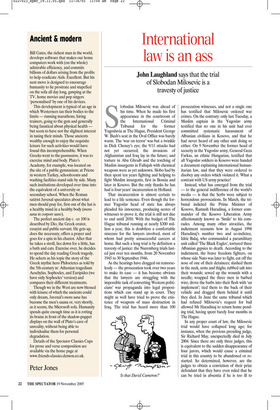Ancient & modern
Bill Gates, the richest man in the world, develops software that makes our home computers work with (on the whole) admirable efficiency, and commits billions of dollars arising from the profits to help eradicate Aids. Excellent. But his next move is designed to encourage humanity to lie prostrate and stupefied on the sofa all day long, gawping at the TV, home movies and pop singers ‘personalised’ by one of his devices.
This development is typical of an age in which Westerners tax their bodies to the limits — running marathons, hiring trainers, going to the gym and generally being fanatical about physical health but seem to have not the slightest interest in taxing their minds. Those ancients wealthy enough to enjoy the requisite leisure for such activities would have found this incomprehensible. When Greeks went to the gumnasion, it was to exercise mind and body. Plato’s Academy, for example, was located on the site of a public gymnasium; at Priene in western Turkey, schoolrooms and washing facilities stand side by side. Many such institutions developed over time into the equivalent of a university or secondary school. When the Roman satirist Juvenal speculates about what men should pray for, first out of the hat is a healthy mind in a healthy body (mens sana in corpore sano).
The perfect ancient day c. AD 100 is described by Dio, the Greek orator, essayist and public servant. He gets up, does the necessary, offers a prayer and goes for a spin in his chariot. After that he takes a stroll, lies down for a little, has a bath and eats. Exercise over, he decides to spend the day reading Greek tragedy. He selects as his topic the story of the Greek mythic hero Philoctetes as told by the 5th-century BC Athenian tragedians Aeschylus, Sophocles, and Euripides (we have only Sophocles’ version) and compares their different treatments.
Though we in the West are now blessed with leisure of which the ancients could only dream, Juvenal’s mens sana has become the men’s sauna or, very shortly, as it seems, the Microsoft sofa. Humanity spends quite enough time as it is rotting its brains in front of the shadow-puppet displays on the wall of Plato’s cave of unreality, without being able to individualise them for personal degradation.
Details of the Spectator Classics Cups for prose and verse composition are available via the home page at www.friends-classics.demon.co.uk.
Peter Jones

























































 Previous page
Previous page